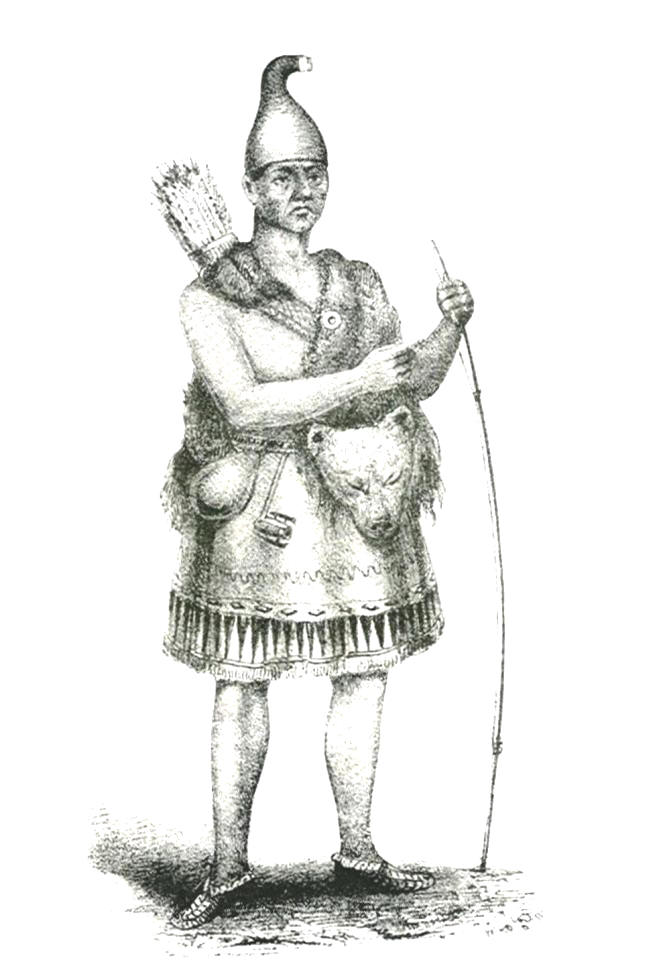|
"Many of the
things that Passaconaway did seem difficult to explain, but that he did them, in
full view of both Indians and whites, there is no doubt. Both official and
unofficial groups came from afar on divers occasion, and ample testimony to the
authenticity of these events was given both verbally and in writing to the
authorities at Massachusetts."
Skeptics said that the events were merely
magic tricks or that the great Passaconaway was, "... in consort with the
Devil." But some of his magic tricks would have been technologically
impossible in the 1600s; and the expression "in consort with the Devil," is
admission that he appeared to have superhuman powers. The following are descriptions of Passaconaway's
feats.
|

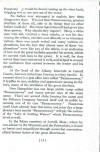


George Calvin Carter, PASSACONAWAY:
THE GREATEST OF THE NEW
ENGLAND INDIANS.
Granite State Press, Manchester NH, 1947. Pp. 12 - 19.
Text of documents . . .
Passaconaway was famous for his almost superhuman feats of
strength and magic. While he performed some of these elsewhere as he went among
the tribes from Winnepesaukees and Ossipees on the north, to the Narragansetts
on the south, his best work in this line was done at Amoskeag, where was to be
found the perfect setting for all that he desired to accomplish in maintaining
his position with the tribes.
Many of the things that he did seem difficult to explain, but
that he did them, in full view of both Indians and whites, there is no doubt.
Both official and unofficial groups came from afar on divers occasion, ample
testimony to the authenticity of these events was given both verbally and in
writing, to the authorities at Massachusetts. One member of an investigating
committee reported that he no doubt did the tricks, if such they were, but that
he did so with the aid of his "Consort the Devil." After he accepted Christianity
he sought the advice of the Apostle Eliot who advised wisely, in view of his
intimate knowledge of the Indian mind, that they might continue so long as he
did not ascribe what he did as due to the favor of deity.
What did the Amoskeags and their visitors witness at Amoskeag
Falls in what is now Manchester? They saw "rocks move, trees dance, green leaves
in winter, blocks of ice in summer, squirming, harmless adders in winter, frozen
fish and frosted branches in summer, and at any season dry leaves curling up and
burning in a bowl, without apparent cause."
He could seemingly call mists to envelope himself together
with all those immediately near him, and to disperse the same mist at will. He
would stand erect upon a pile of small dry sticks, have them ignited until he
seemed to be a veritable flaming man. The mist would come and when presently it
had gone, he would be found calm and unharmed. Reversing the process, the mists
would come while there was no fire. Instantly flames would appear, only to have
entirely vanished when the fleecy clouds passed on.
Perhaps his most spectacular feat was accomplished while
there were numbers of his own and of white visitors grouped on the river bank.
The mist would come and when it had gone he would be found on the other shore
with arms upraised. The watchers would soon be again, enveiled in mist, which
soon passed on, when Passaconaway would be found coming up the river bank,
dripping wet as one just out of the water.
No Indian ever attempted to explain how these things were
done. Was not their Passaconaway, greatest chieftain of them all, able to do
things that no other Indian could do? The Great Spirit himself had given him
these powers. Why should they inquire? Many a white man who did, received a
stern rebuke, as was his due. Among the whites, whether sent officially or as
voluntary visitors, there was much verbal and many written explanations, but the
fact that almost none of these "explanations" were like any of the others, is an
indication of how well the great bashaba guarded his secrets, which he carried
with him to the grave. It is well, for they served their time and served it
well, and helped to cement the confidence that existed between the leader and
his people.
----------
THE LAST LEGEND
Much
more could be written about this truly wonderful Indian, drawn from Provincial
records and private letters written by those who knew Passaconaway and his son
Wonalancet. The legend regarding his death lingered on and was well believed by
the scattered remnants of the Penacook Indians who did not make the long journey
to the St. Francis country in 1677. It was told in great sincerity and
earnestness and woe betide the questioning white man who expressed a doubt. He
was usually met with "We believe your story of the ascension of your Master. Why
should you disbelieve ours?"
It was about the middle of February, 1684. From comparative Indian accounts, it
was well below zero, with a sky of azure blue and not a cloud to be seen
anywhere. Passaconaway had been told to journey to what we now know as Dustin
Island, where the wild rushing Contoocook divides that it may quietly enter the
Merrimack. With whom he had journeyed hither he did not know and could not
remember, for now he found himself erect and alone amidst a circle of glowing
coals, whose rising heat gave him perfect protection from the elements.
Now well past the century mark, the heavy sinews and muscles of former years
shrunken and face much wrinkled, he nevertheless was able to stand erect and
with folded arms await the will of the Great Spirit. Presently the message came
and in almost though not quite audible tones he was told, "Passaconaway, thy
time has come. Watch the southern sky and do my bidding, for thou art speedily
to be made ready for the journey to the Happy Hunting Grounds which the Great
Spirit prepared for those who have done their best."
The message ceased and immediately his eyes, still keen and little dimmed by
age, scanned the sky southward to what we now know as Concord. Here there
appeared to be very small white clouds, which as he watched intently seemed to
be coming northward, following the "River of Swift and Broken Waters."
Nearer and nearer they came to his lonely isle at the mouth of the "Silver
Stream that Winds among the Hills." As the clouds drew nearer they grew larger
and began to swirl round and round, until to his great delight he saw they were
filled with wolves,―wolves, the fastest thing in the forest, and better still, a
sweeping count showed one hundred and twenty, the Indian's idea of the largest
wolf pack ever known.
In wonderment filled with trust he stood erect
and strong, with arms folded as the fires burned low and his own clothing seemed
to take on added winter strength. He noticed that the wolves in the clouds were
stringing out in great circles, two by two, until with one grand sweep they sped
past him before his very eyes.
Was this an apparition or was it real? He was to
know almost instantly. It took only a few brief moments for the wolves to speed
by and come to a sudden stop. Instantly he found before him a magnificent
sledge, heavily laden with well curried and finely softened furs of all the
animals of forest, lake and stream, he had been accustomed to hunt throughout
his long life.
No heavenly message was needed now. The wolves
were already tugging at their traces anxious to be up and away. 'Passaconaway
stepped on a splendid bearskin mat, the largest and best he had ever known, for
was he not "The Son of the Bear?" The softer and finer furs surrounded him with
their warmth, and as his left hand grasped the side of the sledge for
steadiness, he found a long rawhide whip in his right hand. He had seen the
settlers' use these and had always wanted one for himself. Now his wish was
fulfilled.
One crack of the whip was the signal, and away
they sped over the frozen wastes of the Merrimack, crossing meadows at open
rapids or broken waters (falls), but generally following the river northward
through what we now know as Boscawen, Franklin, Tilton, Winnisquam, Laconia, and
Lakeport to Lake Paugus, named after his grandson.
At Arquedahkenash, (The Weirs) it was necessary
to slacken speed for here was his last earthly view of the representatives of
his people. Out on the ice where the Weirs Station now stands, the brief stop
was made, and as he looked upward and to the left, he saw several rows of the
spirit forms of sachems and sagamores with whom he had worked so many years. All
those on the shore had hands and arms extended high in the air,―the Indian's
sign for "Welcome, brother."
He started to address them, but the Great Spirit
sealed his lips. The wolves were again tugging at their traces, anxious to
perform their task. He had given them a quick glance and then again turned to
the left, this time to see the spirit forms of his sachems and sagamores fading
away, with the single right arms and hands of each one lifted high,―the Indian's
sign for "Farewell, brother."
A small group of former Winnepesaukees now
appeared on the shore and this is what they saw. The wolf train with its
precious load sped onward over the glassy surface of the lake, so beautifully
streaked with windrows of the whitest and purest snow. The speed increased, (we
can understand it now as we have seen a modern plane do the same thing) until
the watchers on the shore saw them in the air, making straight for Agiococook
(Mt. Washington) the highest of the hills.
Now but a speck in the sky, they were at the top,
and a brief moment of heavenly light such as they had never experienced before,
illumined the scene. Here in a brilliant light, between two white clouds they
saw their beloved Passaconaway, Greatest Chieftain of the tribes, received into
the welcoming arms of the Great White Spirit,―the God of the Indian, and the God
of all mankind.
George Calvin Carter, PASSACONAWAY: THE GREATEST OF THE NEW
ENGLAND INDIANS. Granite State Press, Manchester NH, 1947. Pp. 12 - 19.
|
|

Beals,
Charles Edward, Jr., PASSACONAWAY IN THE
WHITE MOUNTAINS. Boston: Badger,
1916,
Chapter 1
Very early he realized the effect of his magical powers upon
the multitudes and is reported as having performed extraordinary feats "to
the wonderment and awe" of his superstitious subjects. From Englishmen who
mingled with the Pennacooks, and who were witnesses of several of his
sleight-of-hand tricks, we learn that the powwow swam across the Merrimac under
water at a place where it was far too wide to cross in one breath. It was
explained that, after entering the water on the farther side, a mist was cast
before the spectators' eyes and he was not again seen until he stepped out upon
the bank in front of the wondering beholders.53
Another time we are told that Passaconaway placed a bowl of
water before him. The usual incantation then followed, in the midst of which a
black cloud hovered over the assembled company and suddenly a sharp clap of
thunder rent the air. To the amazement of the spectators, a solid piece of ice
floated in the bowl; this trick was performed in the middle of summer. Settlers,
reporting it, added: 'Which doubtless was done by the agility of Satan, his
consort.' 54
Wood, in his 'New England's Prospect,' says: 'The
Indians report of one Passaconawaw, that hee can make water
burne, the rocks move, the trees dance, metamorphise himself into a flaming man.
Hee will do more; for in winter, when there are no green leaves to be got, hee
will burne an old one to ashes and putting these into water, produce a new
green leaf, which you shall not only see but substantially handle and carrie
away; and make a dead snake's skin a living snake, both to be seen, felt, and
heard. This I write but on the report of the Indians, who confidentially affirm
stranger things.'" 55 The Bashaba could hold a
living, venomous snake in
his hand as if it were a worm.56 From so many sources are these feats reported
that there is little doubt as to their having taken place.""57
53 Morton: New England Canaan, 150-1.
54 Morton:
New England Canaan, 25-6; Force: Historical Tracts, vol.11; Potter:
History of Manchester.
55 Bouton: History of Concord, 20.
56 Same in Bouton; Belknap: History of New
Hampshire, vol. I, 101.
57 See Wood, Morton, Hubbard and later
historians.
Beals, Charles Edward, Jr., PASSACONAWAY
IN THE WHITE MOUNTAINS. Boston: Badger, 1916,
Chapter 1 |
|
C. E. Potter,
HISTORY OF MANCHESTER, 1856, Chap. 5.
"That Sachem or Sagamore
is a Powah of greate estimation amongst all kinde of Salvages, then hee is
at their Revels, (which is the time when a greate company of Salvages
meete from severall partes of the Countre, in amity with their neighbours),
hath advanced his honour in his feats or jugling tricks, (as I may right
terme them), to the admiration of the spectators, whome hee endeavoured to
persuade that hee would goe under water to the further side of a river to
broade for any man to undertake with a breath, which thing hee performed
by swimming over and deluding the company with casting a mist before their
eies that see him enter in and come out but no part of the way hee has bin
seene: likewise by our English in the heat of all summer, to make Ice
appeare in a bowle of faire water, first having the water set before him
hee hath begunne his incantation according to their usual accustom, and
before the same hath been ended a thicke cloude has darkened the aire and
on a sudane a thunderclap hath bin heard that has amazed the natives, in
an instant hee hath shoued a firme peace of Ice to floate in the midst of
the bowle in the presence of the vulgar people, which doubtless was done
by the agility of Satan his consort.
"From which marvelous story we are to infer that Pasaconnaway, to the
character of a brave warrior, added that of a clever juggler. In fact, he
held his people in great awe of him, the Indians supposing him to have
supernatural powers; to have control over their destinies; that he could
make a dry leaf turn green; water burn and then turn to ice; and could
take the rattlesnake in his hand with impunity."
C. E. Potter,
HISTORY OF MANCHESTER, 1856, Chap. 5. |
|

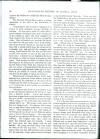
ILLUSTRATED HISTORY OF LOWELL.
Lowell (MA): Courier-Citizen
Co., 1897. Pp. 65-66.
"The early historians agree in the statement that he was
regarded with the highest veneration by all the Indians, on account of a
wonderful power which he was supposed to possess in the use of the magical arts.
"Wood, in his 'New England Prospect,' says of him; 'The
Indians report of one Passaconnan that hee can make 'the water burne, the rocks
move, the trees dance, metamorphize himself into a flaming man. Hee will do
more; for in winter, when there are no green leaves to be got, hee will burne an
old one into ashes and, putting those into water, produce a new green leaf,
which you shall not only see, but handle and carry away; and make of a dead
snake-skin a living snake, both to be seen, felt, and heard'. This I write, but
upon the report of the Indians who confidently affirm stranger things.
"The historian, Thomas Morton, gives a unique description of
the chief of the Pawtuckets, as follows:
"Papasiquineo, that Sachem, or Sagamore, is a Powow of great
estimation amongst all kinde of salvages. At their revels, which is a time when
a great company of salvages meete from several parts of the country in amity
with their neighbors, he hath advanced his honor in his feats of juggling
tricks. Hee will endeavor to persuade the spectators that hee will goe under
water to the further side of the river too broade for any man to undertake with
a breath, which thing hee performed by swimming over, and deluded the company
with casting a mist before their eise that see him enter in and come out, but no
part of the way he has been seene. Likewise by our English in the heate of
summer, to make ice appear in a bowle of faire water. First having the water set
before him, he hath begunne his incantations, and before the same has bin ended
a thick cloud has darkened the aire, and on a sodane a thunder-clap has bin
hearde, and in an instant he hath showed a prime piece of ice to floate in the
middle of a bowle, which, doubtless, was done by the agility of Satan, his
Consort.'"
ILLUSTRATED HISTORY OF LOWELL. Lowell (MA): Courier-Citizen
Co., 1897. Pp. 65-66.
|
|

Coburn, Silas R., HISTORY OF DRACUT MASS. Lowell:
Press of the
Courier-Citizen Co., 1922. Pp. 30-31.
We first hear of Passaconaway in history in 1627. Thomas Morton, being in this
country at this time, thus writes of him in his "New English Canaan":
Papasiquineo the Sachem or Sagamore of the territories near
Merrimack River, a man of the best note in all those parts (and as my
countryman, Mr. Wood, declares in his prospect) a great nigromancer. That Sachem
or Sagamore is a Powah of greate estimation amongst all kinde of Salvages then
hee at their Revels (which is the time when a greate company of Salvages meete
from severall partes of the Countre in amity with the neighbors) hath advanced
his honor in his feats or juggling tricks to the admiration of the spectators
whom hee endeavored to persuade that hee would go under the water to the further
side of the river to broade for any man to undertake with a breath which thing
he performed by swimming over and deluding the company with casting a mist
before their eyes that see him enter in and come out; but no part of the way hee
has bin seene; likewise by our English in the heat of all summer to make Ice in
a bowl of faire water first having the water set before him hath begun his
incantation according to their Usual accustom and before the same has been ended
a thick cloude has darkened the aire and on a sudane a thunder clap hath bin
heard that has amazed the natives; in an instant hee hath showed a firme peace
of Ice to floate in the midste of the bowle in the presence of the vulgar people
which was doubtless done by the agility of Satan his consort.
Coburn, Silas R., HISTORY OF DRACUT MASS. Lowell: Press of the
Courier-Citizen Co., 1922. Pp. 30-31.
|
|
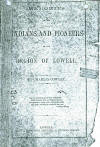
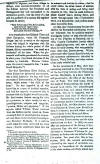
Crowley, MEMORIES OF THE INDIANS AND PIONEERS
OF THE REGION
OF LOWELL. Lowell: Stone & Huse Book Printers, 1862. P. 6.
If the reports which William Wood received from the Indians
can be relied on, Passaconaway's feats of prestidigitation surpassed even those
of our celebrated contemporary, Monsieur Hermann. It is said he could make the
rocks move and the trees dance; that he could turn water into ice in summer and
into fire in winter; that he could clothe the dried leaves of autumn with the
tints of spring, and bring dead serpents to life; that he could metamorphose
himself into a shining flame, and career through space like a Connecticut witch
on a broomstick; and perform many other impossible feats.
|
|

SKETCHES OF REV. JOHN ELIOT AND OTHERS.
Old Residents’
Historical Association Proceedings,
Lowell, MA, 1896. Vol. III, p. 99.
He was the most noted powow and sorcerer of all the country,
and his fame was widespread. It was thought he could cause a green leaf to grow
in winter, trees to dance, and water to burn.
|
And finally from John Greenleaf Whittier:
For that chief had magic skill,
And a Panisee's dark will,
Over powers of good and ill,
Powers which bless and powers which ban;
Wizard lord of Pennacook,
Chiefs upon their war-path shook,
When they met the steady look
Of that wise dark man.
Tales of him the gray squaw told,
When the winter night-wind cold
Pierced her blanket's thickest fold,
And her fire burned low and small,
Till the very child abed,
Drew its bear-skin over bead,
Shrinking from the pale lights shed
On the trembling wall.
All the subtle spirits hiding
Under earth or wave, abiding
In the caverned rock, or riding
Misty clouds or morning breeze;
Every dark intelligence,
Secret soul, and influence
Of all things which outward sense
Feels, or bears, or sees,—
These the wizard's skill confessed,
At his bidding banned or blessed,
Stormful woke or lulled to rest
Wind and cloud, and fire and flood;
Burned for him the drifted snow,
Bade through ice fresh lilies blow,
And the leaves of summer grow
Over winter's wood!
Not untrue that tale of old!
Now, as then, the wise and bold
All the powers of Nature hold
Subject to their kingly will;
From the wondering crowds ashore,
Treading life's wild waters o'er,
As upon a marble floor,
Moves the strong man still.
The Bridal of Pennacook,
Part II, The Bashaba |
Compiled by Dan Mahony.
Passaconaway Menu
 .pdf .pdf

© 2013 danmahony.com
Thank you
for your visit.
|
